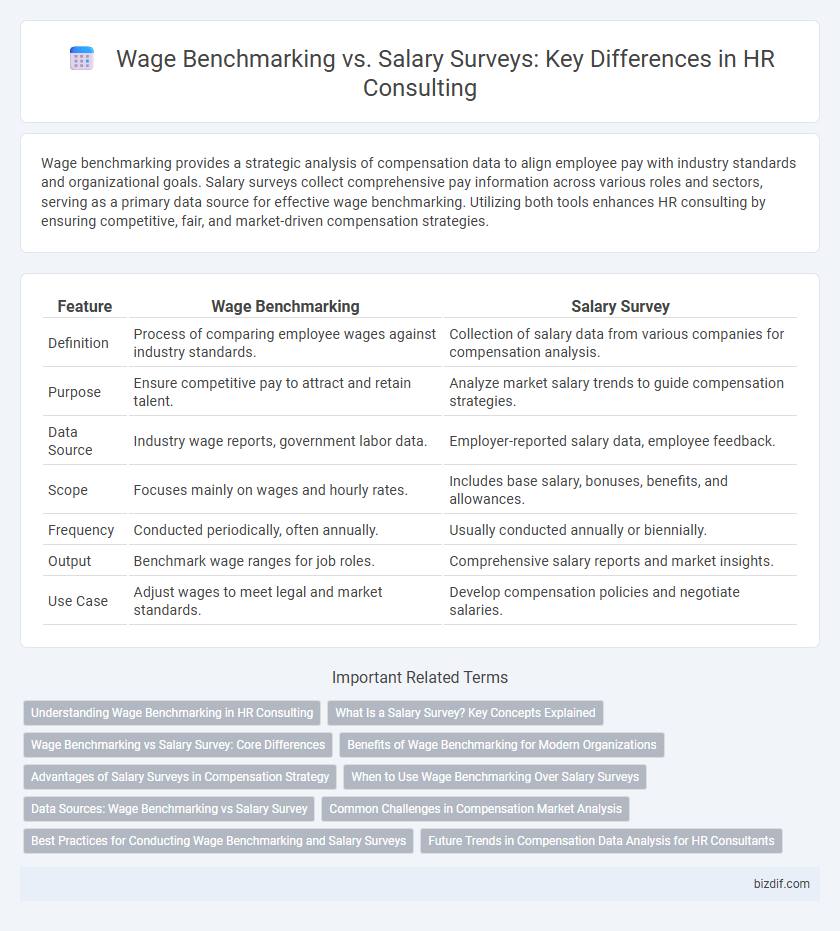Wage benchmarking provides a strategic analysis of compensation data to align employee pay with industry standards and organizational goals. Salary surveys collect comprehensive pay information across various roles and sectors, serving as a primary data source for effective wage benchmarking. Utilizing both tools enhances HR consulting by ensuring competitive, fair, and market-driven compensation strategies.
Table of Comparison
| Feature | Wage Benchmarking | Salary Survey |
|---|---|---|
| Definition | Process of comparing employee wages against industry standards. | Collection of salary data from various companies for compensation analysis. |
| Purpose | Ensure competitive pay to attract and retain talent. | Analyze market salary trends to guide compensation strategies. |
| Data Source | Industry wage reports, government labor data. | Employer-reported salary data, employee feedback. |
| Scope | Focuses mainly on wages and hourly rates. | Includes base salary, bonuses, benefits, and allowances. |
| Frequency | Conducted periodically, often annually. | Usually conducted annually or biennially. |
| Output | Benchmark wage ranges for job roles. | Comprehensive salary reports and market insights. |
| Use Case | Adjust wages to meet legal and market standards. | Develop compensation policies and negotiate salaries. |
Understanding Wage Benchmarking in HR Consulting
Wage benchmarking in HR consulting involves analyzing and comparing employee compensation against industry standards to ensure competitive and equitable pay structures. This process uses comprehensive market data to align salary offerings with organizational goals, employee retention, and talent acquisition strategies. Unlike salary surveys that collect broad compensation data, wage benchmarking provides actionable insights tailored to specific roles and business contexts.
What Is a Salary Survey? Key Concepts Explained
A salary survey collects comprehensive data on employee compensation across various roles, industries, and geographic locations to provide organizations with market-based salary benchmarks. This survey captures base pay, bonuses, benefits, and other forms of remuneration to help businesses align their pay structures competitively. By analyzing aggregated compensation trends, companies can make informed decisions on wage adjustments, budgeting, and talent acquisition strategies.
Wage Benchmarking vs Salary Survey: Core Differences
Wage benchmarking involves the systematic comparison of compensation data to establish competitive pay rates, focusing on market standards and internal equity, while salary surveys collect broad compensation information across industries to identify general pay trends. Wage benchmarking is typically more targeted, tailored to specific roles and company strategy, whereas salary surveys provide aggregated data for broader market insights. Understanding these core differences helps HR professionals design effective compensation strategies aligned with business goals and market conditions.
Benefits of Wage Benchmarking for Modern Organizations
Wage benchmarking offers modern organizations precise insights into competitive compensation levels by analyzing current market data from relevant industries and job roles. This process ensures equitable pay structures that attract and retain top talent while enhancing employee satisfaction and reducing turnover. Leveraging wage benchmarking supports strategic decision-making in salary adjustments and budgeting, aligning compensation packages with business goals and market standards.
Advantages of Salary Surveys in Compensation Strategy
Salary surveys provide precise market data that enable HR professionals to tailor compensation packages competitively, attracting and retaining top talent. These surveys offer comprehensive insights into industry-specific pay trends, helping organizations make informed decisions aligned with current market standards. Utilizing salary survey data enhances compensation strategies by promoting equity and transparency across roles and departments.
When to Use Wage Benchmarking Over Salary Surveys
Wage benchmarking is ideal when organizations need precise, industry-specific compensation data to align salaries with current market standards, particularly for critical or highly specialized roles. Salary surveys offer broader compensation trends but may lack the detailed insights required for targeted wage adjustments or competitive positioning. Use wage benchmarking over salary surveys when accuracy and role-specific pay structures directly impact talent acquisition and retention strategies.
Data Sources: Wage Benchmarking vs Salary Survey
Wage benchmarking relies on internal company data, industry standards, and regional labor market information to establish competitive pay structures. Salary surveys compile external data from multiple organizations across various sectors and geographic locations, providing a broader market overview. Using both data sources ensures informed compensation strategies that align with market trends and organizational goals.
Common Challenges in Compensation Market Analysis
Wage benchmarking and salary surveys both face challenges such as data accuracy, market representativeness, and rapidly changing industry standards. Ensuring reliable compensation market analysis requires overcoming discrepancies in job role definitions and adjusting for geographical cost-of-living variations. These obstacles often complicate the alignment of pay structures with competitive market rates, impacting talent acquisition and retention strategies.
Best Practices for Conducting Wage Benchmarking and Salary Surveys
Effective wage benchmarking and salary surveys require collecting accurate and current compensation data from comparable industries and geographic regions. Best practices involve using standardized job descriptions, ensuring confidentiality to encourage participation, and analyzing data with appropriate statistical methods to identify competitive salary ranges. Leveraging technology platforms for data collection and regularly updating surveys enhances the reliability of compensation strategies and supports informed HR decision-making.
Future Trends in Compensation Data Analysis for HR Consultants
Wage benchmarking uses real-time compensation data to compare salaries against industry standards, enabling precise alignment with market trends, while salary surveys aggregate broad compensation patterns across sectors to identify emerging pay practices. Future trends in compensation data analysis involve leveraging AI-driven analytics and machine learning to predict pay scale shifts and personalize remuneration packages for talent retention. HR consultants will increasingly integrate big data and predictive modeling to create dynamic, competitive compensation strategies responsive to evolving workforce demands.
Wage Benchmarking vs Salary Survey Infographic

 bizdif.com
bizdif.com